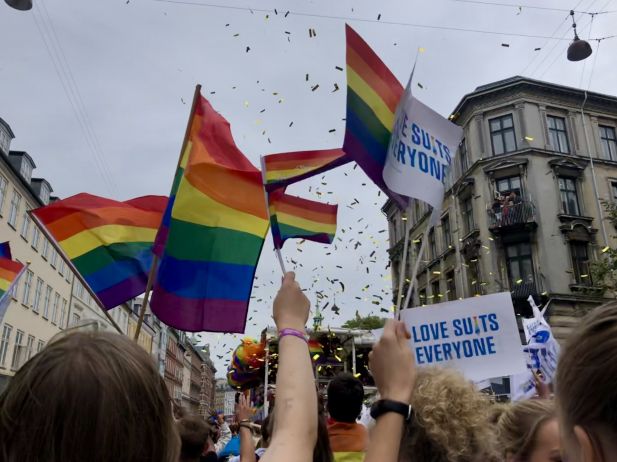Beyond Identity Politics: Pride Parades and Integrative Civil Religion
Beyond Identity Politics: Pride Parades and Integrative Civil Religion

Can Pride be compared to religion? 3 researchers are examining this in a newly launched research project at MPP. The Independent Research Fund Denmark is supporting the project financially for a three-year period, and its main interest and context is this:
A pride parade is a public (and loud) celebration of the values that a democracy can’t be without: Tolerance, inclusivity, consideration for others. Collective confirmations of these values are often associated with the concept of a ‘people’s religion’: Prides celebrate universal values as a public ritual, but they can also cause friction in society. They can be hijacked by businesses and political groups. What will it take to keep Pride as an open public ritual in the future?
The project invited everyone to join a talk and discussion during the resent Copenhagen Pride Week. Find out more here:
- Watch Sine Nørholm Just (Roskilde University and CBS), Stefan Schwarzkopf (CBS), and Jannick Friis Christensen (CBS) talk about Pride as a civic religion during Copenhagen Pride 2020 here. (Time: 3:46:30) (in English)
- Column in Sydsvenskan here (in Danish)
- Column in Politiken here (in Danish)
- Article in CBS Wire here (in English)
|
Project description Pride Parades that promote lesbian, gay, bisexual, transgender and intersex (LGBTI) rights represent a globally growing sociocultural force. The parades increasingly attract corporate sponsorship. For some, this is a sign of success as the backing of large employers signals mainstream public support. For others, this support signals increased commercialization which undermines the LGBTI movement’s political and emancipatory edge. In this project, we explore these tensions and seek to resolve them through an investigation of how Pride might form part of what Robert Bellah called a ‘civil religion’, a bond of allegiance based on universal human rights and solidarity among strangers. Our project addresses the pressing issue of how political and corporate actors may tap into genuine sources of social legitimacy without damaging their authenticity.
Public and private sector organizations in Denmark need a more open reflection on the reasons why they should take part in the Pride Parades and on what exactly is being celebrated. Our research project will deliver three outcomes. Firstly, the project will directly help public and private sector organizations to create inclusive activities that avoid the pitfalls of commercialization and ’political correctness’. Secondly, the project will assist in sensitizing all sections of Danish society to the universal human rights agenda that is being celebrated at Pride. Thirdly, as the world is increasingly looking to Denmark to provide a model that balances social cohesion and economic growth, the project will help demonstrate how Pride can foster a broadly unifying national narrative and move away from its image of a lifestyle enclave.
Our project engages with a wide range of organizations in order to create insights and data. The first of these is Happy Copenhagen, the organization behind the World Pride and EuroGames events in Copenhagen and Malmö in 2021. Happy Copenhagen will provide us with access to its internal meetings, and to its communications with commercial sponsors and various partner organizations such as Københavns Kommune, PanIdreat and LGBT Danmark. Our second collaboration partner is Dansk Industri (DI), the Danish employers’ organization with approx. 10,000 members. DI will assist us in distributing findings to its member base. A representative both of Happy Copenhagen and of DI are members of our project’s Advisory Board. This assures a continuous flow of information and communication between researchers, civil society actors and private business.
Timeline 1 August 2020 – 31 July 2023
Project participants Stefan Schwarzkopf (Principal Investigator) Sine Nørholm Just (Principal Investigator) Jannick Friis Christensen (PostDoc) |